The verse above by Thiruvalluvar aptly mirrors the persona of Prime Minister Narendra Modi, accentuating the paramount importance of action over mere rhetoric or intentions. It delineates distinct personas based on their proactive approach towards tasks: the Great individuals who not only possess the capability but also the unwavering resolve to execute tasks. They are distinguished by their ability to translate thoughts into concrete actions, known for their productivity and accomplishments. On the other hand, there are the ordinary or average individuals who may have the capacity but lack the determination to act upon their ideas, remaining stagnant in the realm of talk and speculation. This timeless Tamil verse underscores the significance of proactive behavior, distinguishing between those who actively pursue their goals and those who remain passive or indecisive. Modi epitomizes the essence of this verse through his commitment to action, evident in his vision of ‘Viksit Bharat 2047’.
India, known as Bharat, boasts a rich cultural heritage and a history of resilience. Since gaining independence from British rule in 1947, Bharat has seen the stewardship of several Prime Ministers. However, it was under the leadership of Narendra Modi, serving two consecutive terms since 2014, that the Bharatiya Janata Party (BJP) emerged victorious in two general elections. Despite facing opposition criticism, the Modi government has articulated a ‘cultural vision for India@2047’, aiming to transform India into a developed nation by its centenary of independence. Amidst the political landscape, characterized by diverse approaches and policies, certain transformative efforts stand out. Modi’s ascension marked a pivotal moment in India’s recent history, ushering in a governance paradigm centered on people-centric development and good governance. Unlike previous administrations, Modi’s policies are driven by a genuine commitment to improving the lives of citizens, transcending political considerations. It is crucial to recognize and appreciate these positive changes, irrespective of political affiliations, as they shape the nation’s trajectory towards progress and prosperity.
Between 2014 and 2024, India underwent a transformative phase under the leadership of the Modi government, marked by a plethora of initiatives aimed at fostering welfare and development across various sectors. These initiatives, including Digital India, Make in India, Start-up India, Skill India, and the Innovation Fund, alongside pivotal schemes such as the Aadhaar-enabled Payment System, Direct Benefit Transfer (DBT) scheme, Smart Cities Mission (SCM), Metrorail Projects, and several Prime Ministerial schemes, have significantly uplifted the lives of citizens nationwide.
This study scrutinizes the impact and significance of the Smart Cities Mission (SCM) within the broader context of the Modi government’s initiatives, with a particular focus on Madurai city among the 100 cities selected for development. By evaluating the implementation and outcomes of the SCM in Madurai, this research aims to gauge the government’s dedication to urban development and modernization efforts.
The Smart Cities Mission (SCM) under Prime Minister Modi’s governance:
The SCM is a visionary project aimed at revolutionizing urban landscapes. This initiative, undertaken by the Modi government, seeks to transform selected cities into ‘Hi-Tech’ urban centers akin to those found in developed countries. The unveiling of the list of 100 smart cities marks a significant milestone in India’s infrastructural evolution, underscoring the government’s commitment to modernize urban spaces and propel the nation into a transformative era of development. With Uttar Pradesh, Tamil Nadu, and Maharashtra leading the charge, the strategic allocation of smart city projects by the government reflects a comprehensive approach to address diverse socio-economic needs across the nation.
Catalyzing Economic Growth:
The allocation of 100 smart cities, with a substantial focus on business and industry centers, demonstrates the government’s proactive stance towards fostering economic growth. By leveraging advanced technologies and enhancing infrastructure, these smart cities serve as hubs for innovation, entrepreneurship, and investment. This not only attracts domestic and foreign investment but also stimulates job creation, revitalizing local economies and contributing to the nation’s GDP.
Enhancing Cultural and Tourism Potential:
The inclusion of cultural and tourist centers within smart cities showcases a nuanced understanding of India’s rich heritage and tourism potential. By integrating modern amenities with historical and cultural assets, these cities offer immersive experiences for tourists while preserving and promoting India’s cultural legacy. Furthermore, enhanced connectivity and sustainable infrastructure amplify the attractiveness of these destinations, positioning India as a premier global tourist hub and bolstering revenue streams.
Prioritizing Education and Healthcare:
Designating smart cities as education and healthcare hubs underscores the government’s commitment to inclusive development and human capital enhancement. By investing in state-of-the-art educational institutions and healthcare facilities, these cities ensure equitable access to quality education and healthcare services. This empowers citizens with knowledge and skills and enhances public health outcomes, fostering a healthier and more productive populace.
Strategic Investment and Fiscal Prudence:
The Modi-led government’s investment of over Rs 3 lakh crore for the initial 5-6 years showcases prudent fiscal management and strategic resource allocation. By directing resources towards infrastructural development, the government lays the groundwork for sustainable urbanization and long-term prosperity. Moreover, the emphasis on public-private partnerships and innovative financing mechanisms ensures optimal utilization of funds, mitigating fiscal risks, and enhancing the efficiency of the smart cities initiative.
The implementation of 100 smart cities represents a paradigm shift in India’s urban development landscape, signaling a departure from conventional approaches towards innovation-driven, sustainable growth. Through strategic planning, inclusive policies, and judicious investments, the Modi government aims to usher in a new era of prosperity, connectivity, and quality of life for millions of citizens. As these smart cities evolve into vibrant hubs of economic activity, culture, education, and healthcare, they epitomize India’s aspirations for progress and prosperity in the 21st century.
What is a Smart City?
A Smart City is equipped with state-of-the-art technology and infrastructure facilities, offering a quality of life on par with international standards. Features such as clean drinking water, uninterrupted electricity, well-laid roads, high-speed internet connectivity, automated waste disposal systems, efficient public transportation, digitalized government services, and affordable housing characterize the infrastructure of a Smart City.
The Smart City Project and Madurai City:
The Modi government launched the Smart City Mission in June 2015, selecting 11 cities in Tamil Nadu, including Madurai, for development as ‘Smart Cities’. The purpose of this initiative is to drive economic growth and enhance the quality of life through local area development and technology integration. This research focuses on various urban spaces of Madurai city, particularly its Smart City Projects, emphasizing reconstruction, urban renewal, and heritage preservation. The Madurai Corporation website highlights 14 developmental and renovation projects initiated under the Smart City Mission, including infrastructure enhancements, tourist amenities, heritage development, and solid waste management.
According to the Madurai Corporation website, seven out of the 14 projects are completed, while the remainders are in progress. However, officials attribute delays to the concentration on the Periyar Integrated Drinking Water Scheme and road construction, neglecting other Smart City projects. Despite six years since the project initiation, Madurai has yet to witness significant development, causing inconvenience to citizens, devotees, and tourists due to road closures and traffic congestion. The slow progress of these projects has raised concerns, especially since they were formulated during the AIADMK government’s tenure, with little attention from the subsequent DMK government.
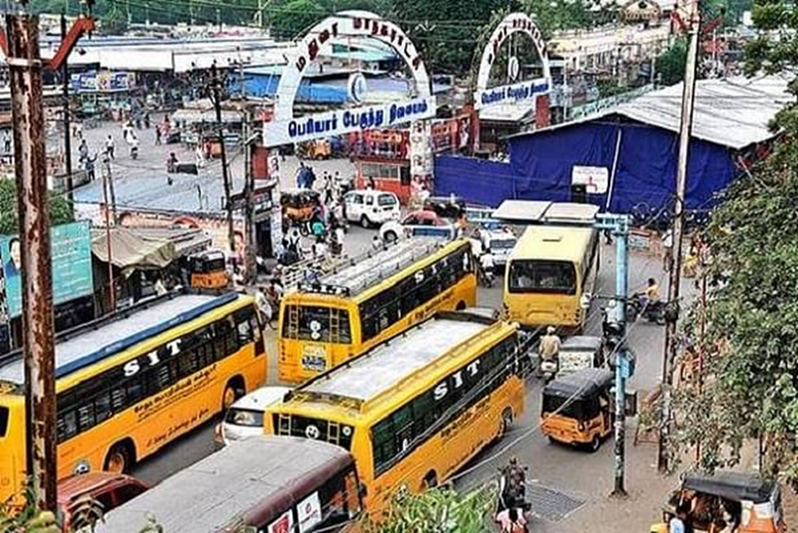
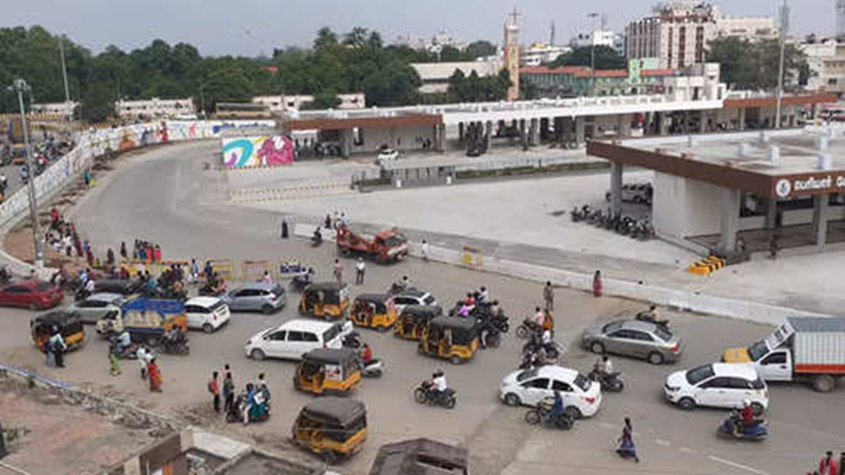
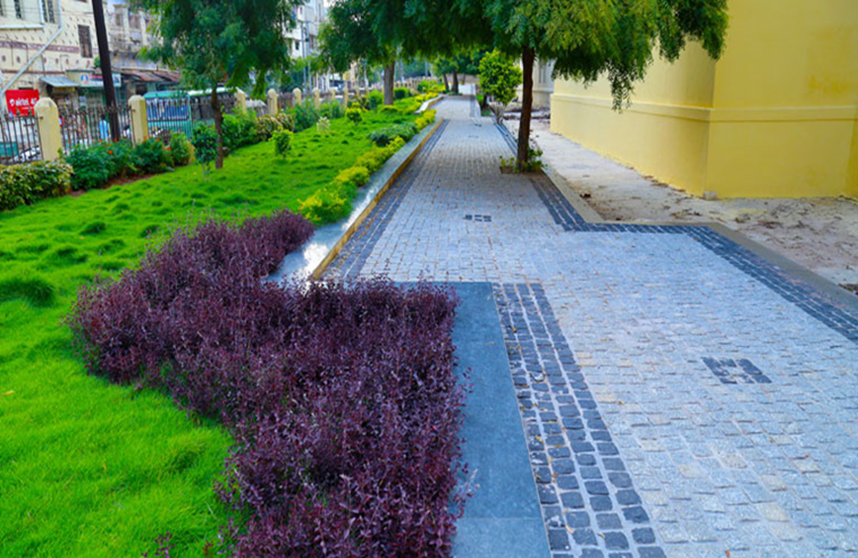
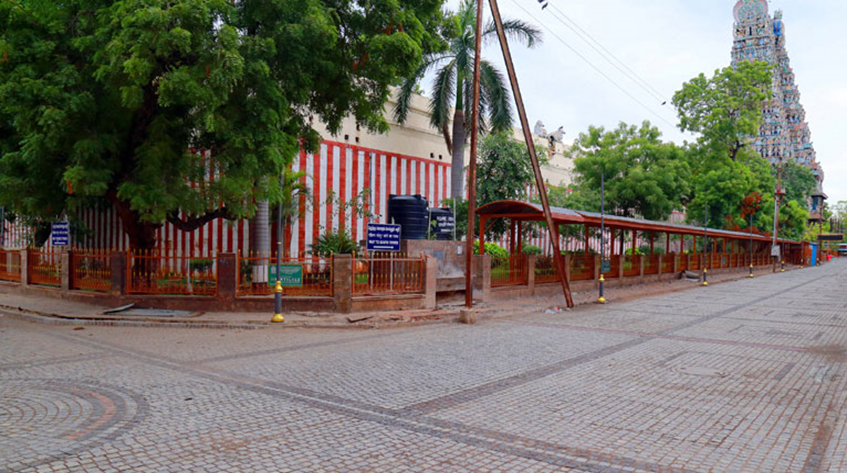
Brief History of Madurai City:
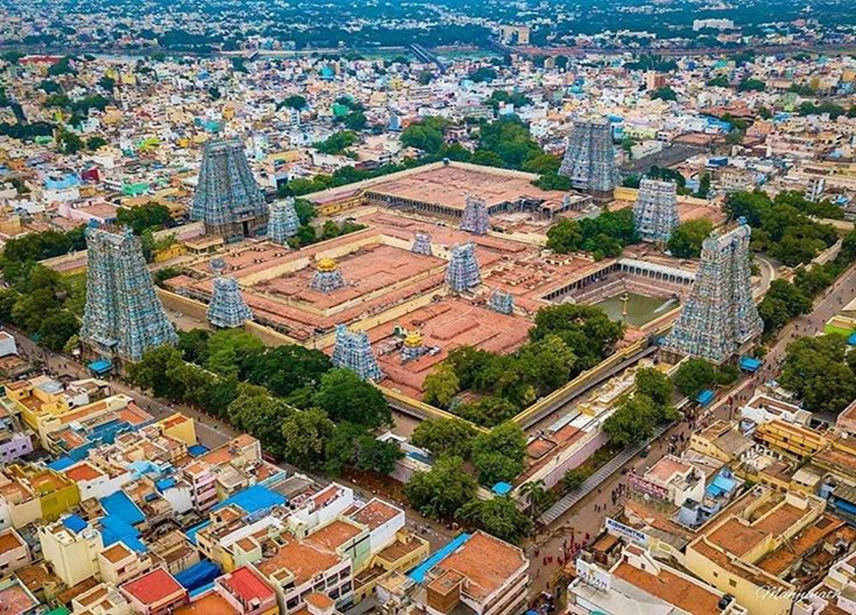
Madurai, one of the ancient cities in Tamil Nadu, situated approximately 450 kilometers southwest of Chennai, the capital city of Tamil Nadu, and nearly 2,200 kilometers south of Delhi, holds a rich historical legacy. In ancient times, the region was known as Mathirai, possibly derived from the protective walls surrounding the city. Tamil literary works refer to it as Nānmatakkutal (the junction of four buildings), a nod to four ancient temples: Kanni, Kariyamal, Kali, and Alavay. Madurai, also dubbed as Thoonga Nagaram (the city never sleep), owing to its bustling markets – Al-Angaadi (night market) and Naal-Angadi (day market) – operating round the clock. Madurai is renowned as the Temple City and the city of festivals, serving as the headquarters of the Pandyan kingdom. At its heart lies the world-famous Meenakshi temple, with a history spanning over two millennia, interwoven with vibrant trade and commerce connections to ancient cities worldwide. However, Madurai faced devastation in the early 14th century under the onslaught of Delhi Sultan Alauddin Khilji’s commander, Malik Kafur. This campaign aimed to subjugate Hindu kingdoms, resulting in the plunder of revered Hindu temples, notably the Meenakshi temple. Despite this dark chapter, the Vijayanagara Kings and later the Nayaks of Madurai undertook temple reconstruction, restoring its former grandeur.
The Duplicitous Politics of DMK in Tamil Nadu:
In Tamil Nadu, a regrettable tradition has taken root where both the DMK and AIADMK parties habitually dismiss and belittle the accomplishments and endeavors of their political adversaries. This entrenched behavior, driven by egocentric politics, has spawned a harmful pattern wherein public welfare initiatives are either rejected or sidelined, despite their potential benefits and the utilization of public funds. Such conduct reveals a troubling mindset among politicians affiliated with these Dravidian parties, suggesting a sense of impunity and a lack of accountability to the electorate. This dismissiveness towards opposing endeavors not only obstructs progress but also fosters an environment conducive to corruption and unethical practices. Unfortunately, this trend persists under the current administration, with the ruling DMK government in Tamil Nadu displaying similar tendencies in handling Smart City projects in Madurai.
Mounting evidence indicates that the DMK has tactically employed delaying strategies, utilizing misinformation to hinder the advancement of these projects. By disseminating falsehoods claiming that the implementation of such initiatives has exacerbated congestion in Madurai, DMK leaders aim to shift blame onto the previous AIADMK government in Tamil Nadu and the Modi government at the center. This calculated maneuver serves to besmirch the reputation of the BJP overall and the Modi administration specifically, advancing their own political agenda at the expense of public welfare and progress. This recurrent pattern not only impedes development but also corrodes public faith in the political system. It is imperative that politicians prioritize the well-being of the populace over petty political rivalries, working collectively to promote the interests of the community. Only through genuine collaboration and a steadfast commitment to transparency and accountability can Tamil Nadu unlock its full potential and effectively tackle the challenges confronting its cities and citizens.
Conclusion
The parallels between the plundering of Madurai in the medieval period and the current state of affairs in 2024 under the DMK rule in Tamil Nadu are striking. Just as Islamic invaders ravaged Madurai for their political interests in the past, today, the DMK rulers seem to be deliberately spoiling and damaging the city to serve their own political agenda. This unfortunate reality echoes the timeless wisdom encapsulated in Thirukural verse 26, which highlights the contrast between virtuous leadership and deceitful governance. Historically, Madurai stood as a beacon of culture and prosperity, renowned for its architectural marvels and vibrant societal fabric. However, the invasion and plundering by Islamic forces left scars on the city, disrupting its harmony and prosperity. Similarly, under the current DMK regime, Madurai’s essence is being eroded, not by external invaders, but by the very politicians entrusted with its well-being. Infrastructure projects are being neglected, civic amenities are deteriorating, and the city’s cultural heritage is being disregarded, all to further the narrow political interests of the ruling party.
The juxtaposition of leadership styles further accentuates this divergence. Prime Minister Modi, through his governance and people-centric policies, has elevated himself to a stature befitting a great leader. His focus on development, inclusive growth, and national welfare projects has garnered widespread admiration and respect. In contrast, the leadership of MK Stalin and his DMK government in Tamil Nadu has plummeted to a nadir of deceit and disregard for the populace. Their anti-people policies, lack of vision, and blatant politicization of governance have tarnished their reputation and undermined the trust placed in them by the electorate. It’s crucial to recognize that the degradation of Madurai under the DMK rule not only reflects the failure of governance but also the erosion of moral integrity and ethical values within the political establishment. By sacrificing the welfare of the people for short-term political gains, the DMK leaders are not only defaming themselves but also betraying the trust of those they were elected to serve. Thus, the plight of Madurai serves as a poignant reminder of the timeless truths embedded in Thirukural verse 26. While leaders like Modi ascend to greatness through their commitment to the welfare of the people, others, like the DMK rulers in Tamil Nadu, descend into ignominy through their self-serving and destructive politics. It is imperative for the citizens to recognize this dichotomy and demand accountability from their elected representatives to ensure the prosperity and well-being of their beloved city and its inhabitants.
Drawing from his extensive experience as the longest-serving Chief Minister of Gujarat, Modi entered the Prime Minister’s office in 2014 with a clear vision for the nation. His tenure has been characterized by decisive action and a commitment to long-term development goals. This vision has resonated with the populace, leading to his re-election in 2019. As the country gears up for its 18th Lok Sabha elections, there is a strong indication that Modi’s track record of effective governance will once again earn him the trust and support of the people. Looking ahead, Modi’s leadership holds the promise of propelling India to greater heights on the global stage. His ambitious vision of ‘Viksit Bharat 2047’ underscores his commitment to transforming India into a developed nation within the next few decades. By laying down a roadmap for sustainable growth and inclusive development, Modi aims to position India as a formidable player in the international arena. In short, Narendra Modi’s tenure as Prime Minister has ushered in a paradigm shift in Indian governance, prioritizing the welfare of the people and fostering a culture of good governance. As the nation prepares for its future, there is a compelling case for re-electing Modi, whose leadership has the potential to steer India towards a prosperous and powerful future. His third term as Prime Minister could well pave the way for India’s emergence as a global superpower, fulfilling the aspirations of ‘Viksit Bharat’ and propelling the nation towards a brighter tomorrow.
About the authors:
Salvarpatti M. Ponnudurai is an independent researcher based in Delhi with a PhD degree in Art History from the School of Arts & Aesthetics, Jawaharlal Nehru University, New Delhi. Views expressed are personal.
(The views expressed are the author's own and do not necessarily reflect the position of the organisation)

